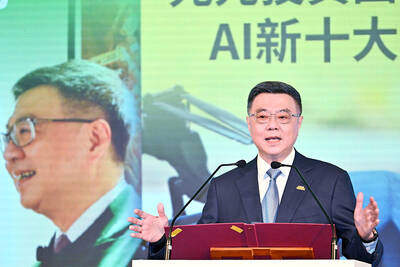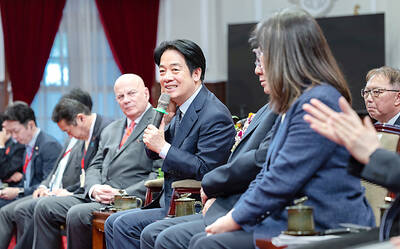Taiwan is looking forward to strengthening its alliance with the US and other democratic nations to help contain the spread of authoritarianism, President William Lai (賴清德) said yesterday when meeting with academics from the Hoover Institution Project on Taiwan in the Indo-Pacific Region at the Presidential Office in Taipei.
The Ukraine-Russia War, the Israeli invasion of Gaza and Chinese military exercises have significantly challenged the rules-based world order, Lai told the delegation led by retired US admiral James Ellis Jr.
As Taiwan is situated in the first island chain and at the forefront of democracies’ defense, it would continue to contribute to global democracy, peace and prosperity, Lai said.

Photo: CNA
Taiwan’s implementation of the “four pillars” action plan would strengthen its national defense, bolster its economic safety and deepen partnerships with democratic nations, he added.
Lai defined the four pillars as building up the nation’s defense capabilities, promoting economic security and fostering supply chain resilience, forming partnerships with other democracies, and maintaining cross-strait peace and stability with steady and principled leadership.
The US strategy to build “grid-shaped” partnerships has encouraged mutual support among its Atlantic and Indo-Pacific allies, and Taiwan hopes for more robust and tighter collaboration with the US and other democratic allies to prop up a “democratic umbrella” to safeguard democratic nations from the threat presented by authoritarian states, Lai said.
Ellis thanked the president and said the presence of a senior participant from Australia, former Australian minister for defence and minister for foreign affairs Marise Payne, now a distinguished visiting fellow at the Stanford, California-based Hoover Institution, highlighted the hope for a stable and prosperous region among trusted Indo-Pacific partners.
In the wake of the Russian invasion of Ukraine, and combined with the increasingly troubling collaboration among China, Russia, Iran and North Korea, what happens in one part of the world reverberates to other parts, Ellis said.
“We are all truly living in a historical moment, and our democracies face new responsibilities to deal with that reality,” he said.
He said every Taiwanese engineer working long hours with new American colleagues, every Taiwanese student venturing to a US university and every molecule of liquid natural gas bound for Taiwan from the US makes Taiwan stronger.
He said that both nations’ collective commitment to preserving democratic values would be demonstrated by their actions, individually and collectively.
In closing, Ellis said the US could not ask for a better partner than Taiwan on “this historic journey.”

Two US House of Representatives committees yesterday condemned China’s attempt to orchestrate a crash involving Vice President Hsiao Bi-khim’s (蕭美琴) car when she visited the Czech Republic last year as vice president-elect. Czech local media in March last year reported that a Chinese diplomat had run a red light while following Hsiao’s car from the airport, and Czech intelligence last week told local media that Chinese diplomats and agents had also planned to stage a demonstrative car collision. Hsiao on Saturday shared a Reuters news report on the incident through her account on social media platform X and wrote: “I

STILL ON THE TABLE: The government is not precluding advanced nuclear power generation if it is proven safer and the nuclear waste issue is solved, the premier said Taiwan is willing to be in step with the world by considering new methods of nuclear energy generation and to discuss alternative approaches to provide more stable power generation and help support industries, Premier Cho Jung-tai (卓榮泰) said yesterday. The government would continue to develop diverse and green energy solutions, which include considering advances in nuclear energy generation, he added. Cho’s remarks echoed President William Lai’s (賴清德) comments in an interview last month, saying the government is not precluding “advanced and newer nuclear power generation” if it is proven to be safer and the issue of nuclear waste is resolved. Lai’s comment had

‘BUILDING PARTNERSHIPS’: The US military’s aim is to continue to make any potential Chinese invasion more difficult than it already is, US General Ronald Clark said The likelihood of China invading Taiwan without contest is “very, very small” because the Taiwan Strait is under constant surveillance by multiple countries, a US general has said. General Ronald Clark, commanding officer of US Army Pacific (USARPAC), the US Army’s largest service component command, made the remarks during a dialogue hosted on Friday by Washington-based think tank the Center for Strategic and International Studies. Asked by the event host what the Chinese military has learned from its US counterpart over the years, Clark said that the first lesson is that the skill and will of US service members are “unmatched.” The second

STANDING TOGETHER: Amid China’s increasingly aggressive activities, nations must join forces in detecting and dealing with incursions, a Taiwanese official said Two senior Philippine officials and one former official yesterday attended the Taiwan International Ocean Forum in Taipei, the first high-level visit since the Philippines in April lifted a ban on such travel to Taiwan. The Ocean Affairs Council hosted the two-day event at the National Taiwan University Hospital International Convention Center. Philippine Navy spokesman Rear Admiral Roy Vincent Trinidad, Coast Guard spokesman Grand Commodore Jay Tarriela and former Philippine Presidential Communications Office assistant secretary Michel del Rosario participated in the forum. More than 100 officials, experts and entrepreneurs from 15 nations participated in the forum, which included discussions on countering China’s hybrid warfare